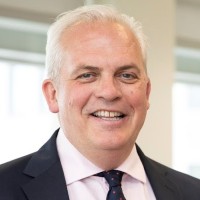Mike has held a number of senior positions across central government and was the 2021/22 CIPFA President.
Mike Driver's CIPFA journey

His career in public service started when he joined the Department of Health and Social Security straight from school. He worked in operational delivery before moving into regional management and then into a series of policy roles.
Mike moved into government finance in 1999 and went on to hold a number of roles, including Chief Financial Officer (CFO) at the Department for Work and Pensions from 2012. In 2016 he was appointed as CFO for the Ministry of Justice (MoJ), and, in 2017, as Head of the Government Finance Function (GFF) for HM Treasury. As Head of the GFF, he focused on driving the agenda to substantially strengthen the finance function's critical role at the heart of government.
Beginning in August 2020, Mike spent six months as the Interim Permanent Secretary at the MoJ, before being appointed the Senior Responsible Officer for the Borders and Managed Quarantine Service. In September 2021, after 42 years, Mike retired from the Civil Service and now has a portfolio career. Mike is a member of the CIPFA Board and Council and is CIPFA President for 2021/22. He is also a member and Fellow of the Chartered Institute of Management Accountants.
Why did you join the public service?
Like many people, I joined for altruistic reasons: I wanted to help other people. Early on in my career I had the fortune to meet great people who openly encouraged me to be the best I could be. Managers, for example, were willing to coach and mentor me along the way, as well as provide opportunities to see the value of the public sector to society. From this experience I realised that, once in a professionally-qualified finance role, I would be able to have a greater impact and influence, as finance was seen by many as a well-regarded and trusted partner.
To this day my vision for the civil service finance function is for finance to be at the heart of decision making, driving decisions, and not about keeping score. In fact, to be a trusted finance business partner, you must be able to offer more than traditional finance skills and capabilities. Today we need people who are well-rounded, strong business people, with an aptitude for big data and digital innovation, who can interpret the financial dynamics of modern government.
Why did you choose a CIPFA accounting qualification?
I reached a point in my career where I realised that if I was going to make a bigger difference, then I needed to secure a professional finance qualification. I chose the CIPFA Accelerated Route for Executives. Whilst I had a certain degree of experience and knew a lot of what I needed to in order to do my role, I could also see gaps in my knowledge. I wanted to fully understand the language used in finance, for example, and felt that a CIPFA accounting qualification would provide the professional authority which I felt was missing.
Throughout my career I have worked to create opportunities and a CIPFA qualification has underpinned this. It's important as a new graduate that you own your career development. Make sure you have a coach and mentor, and make sure you ask for opportunities otherwise you will miss them. Finally, throw yourself into volunteering as not only is it rewarding, it will also help you to develop and lead.
What advice would you give new CIPFA graduates?
If anyone in your team wants to speak to you, always make the time as most people will have something on their mind that they need to discuss. Really this is about making yourself accessible particularly when you climb higher up the career ladder. Secondly, if someone is looking for a volunteer, put your hand up, because life is a lot more interesting through volunteering. Don't bunker down.
As the role and influence of artificial intelligence and technology grow, the future of finance is increasingly coming under the spotlight. Many jobs that exist today will disappear over time as certain finance functions become automated. Therefore, it's important that new graduates help to shape, broaden and deepen our profession. Ultimately, government is trying to achieve a set of outcomes and finance should support this in terms of assuring value for money, advising on deliverability, and offering good guidance.
I would also recommend watching Steve Job's 2005 Stanford commencement address, as it is still a strikingly impressive piece.
